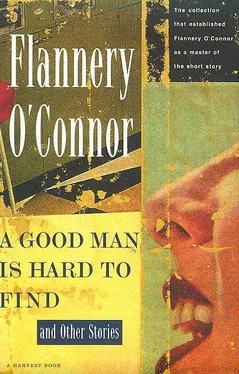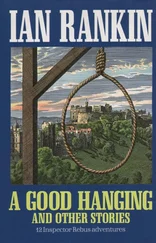Mrs. Shortley wagged her head but would not say anything else. The fact was she had nothing else to say for this intuition had only at that instant come to her. She had never given much thought to the devil for she felt that religion was essentially for those people who didn’t have the brains to avoid evil without it. For people like herself, for people of gumption, it was a social occasion providing the opportunity to sing; but if she had ever given it much thought, she would have considered the devil the head of it and God the hanger-on. With the coming of these displaced people, she was obliged to give new thought to a good many things.
“I know what Sledgewig told Annie Maude,” she said, and when Mrs. McIntyre carefully did not ask her what but reached down and broke off a sprig of sassafras to chew, she continued in a way to indicate she was not telling all, “that they wouldn’t be able to live long, the four of them, on seventy dollars a month.”
“He’s worth raising,” Mrs. McIntyre said. “He saves me money.”
This was as much as to say that Chancey had never saved her money. Chancey got up at four in the morning to milk her cows, in winter wind and summer heat, and he had been doing it for the last two years. They had been with her the longest she had ever had anybody. The gratitude they got was these hints that she hadn’t been saved any money.
“Is Mr. Shortley feeling better today?” Mrs. McIntyre asked.
Mrs. Shortley thought it was about time she was asking that question. Mr. Shortley had been in bed two days with an attack. Mr. Guizac had taken his place in the dairy in addition to doing his own work, “No he ain’t,” she said. “That doctor said he was suffering from over-exhaustion.”
“If Mr. Shortley is over-exhausted,” Mrs. McIntyre said, “then he must have a second job on the side,” and she looked at Mrs. Shortley with almost closed eyes as if she were examining the bottom of a milk can.
Mrs. Shortley did not say a word but her dark suspicion grew like a black thunder cloud. The fact was that Mr. Shortley did have a second job on the side and that, in a free country, this was none of Mrs. McIntyre’s business. Mr. Shortley made whisky. He had a small still back in the farthest reaches of the place, on Mrs. McIntyre’s land to be sure, but on land that she only owned and did not cultivate, on idle land that was not doing anybody any good. Mr. Shortley was not afraid of work. He got up at four in the morning and milked her cows and in the middle of the day when he was supposed to be resting, he was off attending to his still. Not every man would work like that. The Negroes knew about his still but he knew about theirs so there had never been any disagreeableness between them. But with foreigners on the place, with people who were all eyes and no understanding, who had come from a place continually fighting, where the religion had not been reformed—with this kind of people, you had to be on the lookout every minute. She thought there ought to be a law against them. There was no reason they couldn’t stay over there and take the places of some of the people who had been killed in their wars and butcherings.
“What’s furthermore,” she said suddenly, “Sledgewig said as soon as her papa saved the money, he was going to buy him a used car. Once they get them a used car, they’ll leave you.”
“I can’t pay him enough for him to save money,” Mrs. McIntyre said. “I’m not worrying about that. Of course,” she said then, “if Mr. Shortley got incapacitated, I would have to use Mr. Guizac in the dairy all the time and I would have to pay him more. He doesn’t smoke,” she said, and it was the fifth time within the week that she had pointed this out.
“It is no man,” Mrs. Shortley said emphatically, “that works as hard as Chancey, or is as easy with a cow, or is more of a Christian,” and she folded her arms and her gaze pierced the distance. The noise of the tractor and cutter increased and Mr. Guizac appeared coming around the other side of the cane row. “Which can not be said about everybody,” she muttered. She wondered whether, if the Pole found Chancey’s still, he would know what it was. The trouble with these people was, you couldn’t tell what they knew. Every time Mr. Guizac smiled, Europe stretched out in Mrs. Shortley’s imagination, mysterious and evil, the devil’s experiment station.
The tractor, the cutter, the wagon passed, rattling and rumbling and grinding before them. “Think how long that would have taken with men and mules to do it,” Mrs. McIntyre shouted. “We’ll get this whole bottom cut within two days at this rate.”
“Maybe,” Mrs. Shortley muttered, “if don’t no terrible accident occur.” She thought how the tractor had made mules worthless. Nowadays you couldn’t give away a mule. The next thing to go, she reminded herself, will be niggers.
In the afternoon she explained what was going to happen to them to Astor and Sulk who were in the cow lot, filling the manure spreader. She sat down next to the block of salt under a small shed, her stomach in her lap, her arms on top of it. “All you colored people better look out,” she said. “You know how much you can get for a mule.”
“Nothing, no indeed,” the old man said, “not one thing.”
“Before it was a tractor,” she said, “it could be a mule. And before it was a Displaced Person, it could be a nigger. The time is going to come,” she prophesied, “when it won’t be no more occasion to speak of a nigger.”
The old man laughed politely. “Yes indeed,” he said. “Ha ha.”
The young one didn’t say anything. He only looked sullen but when she had gone in the house, he said, “Big Belly act like she know everything.”
“Never mind,” the old man said, “your place too low for anybody to dispute with you for it.”
She didn’t tell her fears about the still to Mr. Shortley until he was back on the job in the dairy. Then one night after they were in bed, she said, “That man prowls.”
Mr. Shortley folded his hands on his bony chest and pretended he was a corpse.
“Prowls,” she continued and gave him a sharp kick in the side with her knee. “Who’s to say what they know and don’t know? Who’s to say if he found it he wouldn’t go right to her and tell? How you know they don’t make liquor in Europe? They drive tractors. They got them all kinds of machinery. Answer me.”
“Don’t worry me now,” Mr. Shortley said. “I’m a dead man.”
“It’s them little eyes of his that’s foreign,” she muttered. “And that way he’s got of shrugging.” She drew her shoulders up and shrugged several times. “Howcome he’s got anything to shrug about?” she asked.
“If everybody was as dead as I am, nobody would have no trouble,” Mr. Shortley said.
“That priest,” she muttered and was silent for a minute. Then she said, “In Europe they probably got some different way to make liquor but I reckon they know all the ways. They’re full of crooked ways. They never have advanced or reformed. They got the same religion as a thousand years ago. It could only be the devil responsible for that. Always fighting amongst each other. Disputing. And then get us into it. Ain’t they got us into it twict already and we ain’t got no more sense than to go over there and settle it for them and then they come on back over here and snoop around and find your still and go straight to her. And liable to kiss her hand any minute. Do you hear me?”
“No,” Mr. Shortley said.
“And I’ll tell you another thing,” she said. “I wouldn’t be a tall surprised if he don’t know everything you say, whether it be in English or not.”
“I don’t speak no other language,” Mr. Shortley murmured.
Читать дальше









